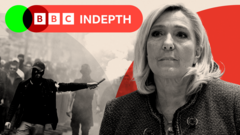The recent court ruling barring Marine Le Pen from running in the 2027 presidential election has ignited a storm of outrage among France's political right while raising questions about the future of her party and its impact on the upcoming elections.
**Marine Le Pen's Ban: A Turning Point for the French Far Right**

**Marine Le Pen's Ban: A Turning Point for the French Far Right**
The legal ramifications for Le Pen cast a shadow over the National Rally and prompt reactions from across the political spectrum.
In a political uproar that has gripped France, the bar imposed on Marine Le Pen from participating in the 2027 presidential elections has not only stirred indignation within the National Rally (RN) but has also sparked broader conversations on the state of democracy in France. Following a court ruling that many in the far right have branded as an act of political persecution, Le Pen, a prominent figure in French politics and known for her hardline stance, has been vocally critical, alleging that the nation's democratic foundations are under siege.
On national television, a close aide urged viewers to express their outrage at what they perceive as an unjust decision. This moment has created a tumultuous atmosphere across French political circles, with Le Pen and her supporters framing her ban as a severe infringement on citizens' choice in leadership. Comparing herself to Alexei Navalny—a notable figure in Russian opposition politics—Le Pen warned that the ruling signifies that the establishment sees her party as a serious threat to their grip on power.
In pondering the broader implications, analysts are weighing whether this decision will consolidate support for Le Pen or further splinter France’s far-right factions. The political landscape remains uncertain, particularly with no clear contender for president emerging since Emmanuel Macron is ineligible for reelection. The latest polls show varied public sentiment; while a significant portion of the electorate is favorable to Le Pen, a slightly larger proportion believes that disqualifying her was justified.
Le Pen's legal troubles arise from allegations of embezzling funds from the European Parliament, and the court’s verdict reflects a stringent stance on corruption that has met public approval. Critics of Le Pen draw attention to the hypocrisy of those within the political elite who once championed these corruption curbs but now allege foul play against her.
As the far right grapples with these revelations, the future of the RN hangs in the balance. The party’s potential response to the ruling, be it through efforts to destabilize the current government or seek alternative leadership, could reshape French politics. Young party members, such as Jordan Bardella, may rise as figures to watch; Bardella's appeal to younger voters suggests potential for the RN to maintain influence despite Le Pen’s setbacks.
Ultimately, the repercussions of this recent verdict are poised to reverberate throughout France’s political landscape. With Le Pen’s ambitions thwarted, her political legacy may pivot on whether she will emerge as a martyr of political injustice or falter under the weight of her legal challenges—a crossroads that will shape the future of the National Rally and the broader far-right movement in France.




















